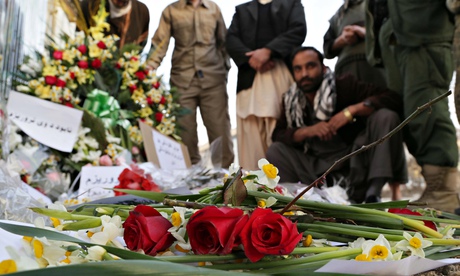Reporter killed in unprecedented attack on civilian in Kabul's embassy quarter, close to restaurant bombed by Taliban.
Afghans lay flowers after the attack on a Lebanese restaurant in Kabul in January, in which 21 people were killed. Photograph: S Sabawoon/EPA
Gunmen have shot dead a British-Swedish journalist in the embassy quarter of Kabul in an unusual attack using a pistol with a silencer.
Police said the man, who had been in the country only a few days, had been killed when travelling from his hotel to the ruins of a restaurant bombed by the Taliban in January. He had been planning to meet a survivor there for a report.
A senior source at the city's criminal investigation department said: "He was on his way to the Lebanese restaurant to interview the cook when he was shot. He was taken to hospital but died there from his injuries." The gunmen fled the scene but two suspects were arrested.
"The weapon used was a pistol with silencer," the source added. The translator working with the reporter had also been detained for questioning.
The journalist had got out of a Toyota Corolla car and was walking down the street, when he was shot, said witness Zubair Atta Mohammad. "He was shot in the head and the road was covered with blood," Mohammad said, adding that he had not seen the attackers.
The British and Swedish embassies said they were investigating reports that one of their nationals had been targeted.
A Taliban spokesman, Zabihullah Mujahid, said the group was not immediately claiming responsibility for the shooting but added that he would speak to insurgent groups on the ground.
The attack happened as Kabul prepared to bury the Afghan vice-president, Mohammad Qasim Fahim, who died from heart problems at the weekend. The city's security forces were focused on that event.
Although the city endures regular bombings on government, diplomatic and military buildings, causing dozens of civilian casualties, and there are regular assassination attempts on prominent politicians, it is unprecedented for a civilian to be targeted in broad daylight at the fringes of the heavily fortified diplomatic district.
The area is normally full of police and private security guards keeping watch over the mansions of the rich and powerful, and many roads are blocked off by boom gates.
• Mokhtar Amiri contributed to this report







